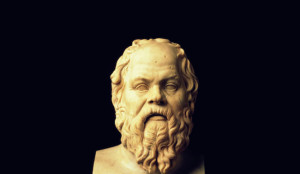2400 years old 30 quotes from Socrates
1. Wisdom begins in wonder.
Bilgelik meraktan doğar.
2. The only true wisdom is in knowing you know nothing.
3. To know, is to know that you know nothing. That is the meaning of true knowledge.
Gerçek bilginin anlamı, hiçbir şey bilmediğinizi bilmektir.
4. Be as you wish to seem.
Görünmek istediğin gibi ol !
5. Education is the kindling of a flame, not the filling of a vessel.
6. Strong minds discuss ideas, average minds discuss events, weak minds discuss people.
Güçlü beyinler fikirleri tartışır, ortalama beyinler olayları tartışır, zayıf beyinler insanları tartışır.
7. To find yourself, think for yourself.
Kendini bulmak için kendin için düşün.
8. He who is not contented with what he has, would not be contented with what he would like to have.
Sahip olduklarından hoşnut olmayan, sahip olmak istediği şeylere sahip olsa da memnun olmaz.
9. Be slow to fall into friendship, but when you are in, continue firm and constant.
Dost olmak için acele etme, ama dost olduysan sürekli ve iyi bir dost ol.
10. By all means marry; if you get a good wife, you’ll become happy; if you get a bad one, you’ll become a philosopher.
Kesin evlenilmeli; Eğer iyi bir eş bulursanız, mutlu olacaksınız; Eğer kötü bir eş bulursanız filozof olacaksınız.
11. Sometimes you put walls up not to keep people out, but to see who cares enough to break them down.
Bazen duvarlar koyarsınız, insanları dışarıda tutmak için değilde kimin bu duvarları parçalayacağını, kimin kayıtsız kalacağını görmek için.
12. Let him who would move the world first move himself.
Bırakın dünyayı hareket ettirmek isteyen, önce kendisi hareket etsin.
13. The only good is knowledge and the only evil is ignorance.
Tek iyilik bilgi ve tek kötülük cehalettir.
14. Contentment is natural wealth, luxury is artificial poverty.
Sahip olduğundan hoşnutluk doğal zenginlik, lüks ise yapay yoksulluktur.
15. Do not do to others what angers you if done to you by others.
Başkalarının sizi kızdırdıklarının, siz başkalarına yapmayın.
16. Every action has its pleasures and its prices.
Her eylemin bir kazanımı ve bir bedeli vardır.
17. We cannot live better than in seeking to become better.
Daha iyi olmaya çalıştığımızdan daha iyi olamayız.
18. Prefer knowledge to wealth, for the one is transitory, the other perpetual.
19. Death may be the greatest of all human blessings.
20. Those who are hardest to love, need it the most.
21. The secret of change is to focus all of your energy, not on fighting the old, but on building the new.
22. The secret of happiness, you see, is not found in seeking more, but in developing the capacity to enjoy less.
23. I know you won’t believe me, but the highest form of human excellence is to question oneself and others.
24. Understanding a question is half an answer.
25. Life is full of questions. Idiots are full of answers.
27. I cannot teach anyone anything, I can only make them think.
28. The unexamined life is not worth living.
29. To move the world we must move ourselves.
And last, but not the least,
30. Know thyself.
Socrates was born circa 470 BC in Athens, Greece. His father was a stone mason and sculptor, and his mother was a midwife. Being an ordinary Athenian, he received a basic Greek education. For many years he worked as a stone mason, before he dedicated his life to philosophy. He was married and had three children, none of whom he cared much of. His rest of the life went on to teach young boys on their intellectual development and their life. He believed in authentic knowledge, rather than only victory over his rival.
Socrates. A Greek philosopher. An enigmatic genius. The standard set by him, his critical reasoning, his view on life and surrounding made him an admirable inspiration to many who came across his teachings, and also had accusers who eventually put him to trial and execution.
He was famous for questioning everything in life and the world. He would accept no vague answers, rather, he would ask only for appropriate account of the nature of the problem. Socrates lived an impoverished life. Despite being such a significant figure in philosophy, he never left a word about himself. Whatever we get to know about him, it was all second-hand. Most of them are from the dialogues of Plato and Xenophon, and the plays of Aristophanes. The dialogues from Plato’s account have to be fairly accurate because the latter himself was a philosopher and had a tendency of including his own theories into dialogues.
Socrates was 70 years old when his trial and execution took place. This was in 399 BC. The trial happened because according to his accusers, Socrates was “refusing to recognise the gods recognised by the state”, and “corrupting the youth”. Because he had an anti-democratic point of view. Because his haters thought Socrates was introducing the youths to new gods. He had three hours to present his case and to defend himself, instead, he presented philosophical ideas which the 500 members of the jury refused to understand. He was also given the option to get exiled from Athens. But he declined the offer. Thus, Socrates was given a cup of poison hemlock to drink. And that made him his own executor.
Category: Uncategorized


